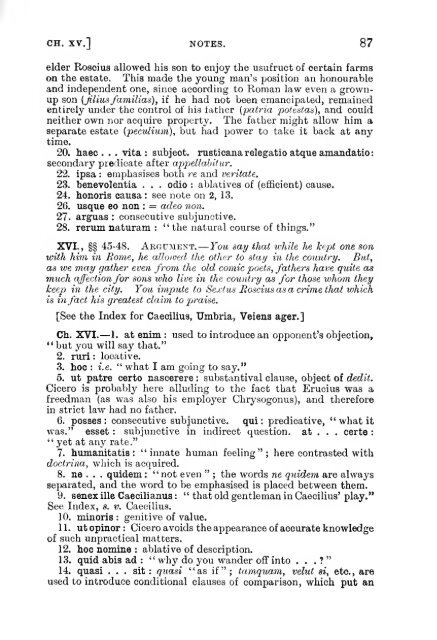Pro S. Roscio Amerino
Pro S. Roscio Amerino
Pro S. Roscio Amerino
You also want an ePaper? Increase the reach of your titles
YUMPU automatically turns print PDFs into web optimized ePapers that Google loves.
CH. XV.] NOTES. 87<br />
elder Rosciua allowed his son to enjoy the usufructof certain farms<br />
on the estate. This made the young man's position an honourable<br />
and independent one, since according to Roman law even a grownup<br />
son (Jiliiis familias), if he had not been emancipated, remained<br />
entirely under the control of liis fatlier (patria potestas), and could<br />
neither own nor acquire property. The father might allow him a<br />
separate estate (peculium), but had power to take it back at any<br />
time.<br />
20. haec . . . vita : subjeot. nisticanarelegatioatqueamandatio:<br />
secondary predicate after appellahitur.<br />
22. ipsa : emphasises both re and veritate.<br />
23. benevolentia . . . odio : ablatives of (efficient) cause.<br />
24. honoris causa : see note on 2, 13.<br />
adeo non.<br />
26. usque eo non : =<br />
27. arguas : consecutive subjunctive.<br />
28. renun naturam " : the natural course of things."<br />
XVI., §§ 45-48. Argument.— You say that u^hile he lcept one son<br />
with him in Bome, he allowed the other to stay in the country. But,<br />
as we may gather even from the old comic poets, fathers have quite as<br />
much affectionfor sons who live in the country as for those whom they<br />
keep in the city. You impute to Se.ctus Boscius as a crime that which<br />
is infact his greatest claim to pjraise.<br />
[See the Index for Caecilius, Umbria, Veiens ager.]<br />
Ch. XVI.— 1. at enim : used to introduce an opponenfs objection,<br />
" but you will say that."<br />
2. ruri : locative.<br />
3. hoc : i.e. " what I am going to say."<br />
5. ut patre certo nascerere : substantival clause, object of dedit.<br />
Cicero is probably here alluding to the fact tliat Erucius was a<br />
freedman (as was also his employer Chrysogonus), and therefore<br />
in strict law had no father.<br />
6. posses: consecutive subjunctive. qui: predicative, "whatit<br />
was." esset : subjunctive in indirect question. at . . . certe :<br />
"yet at any rate."<br />
7. humanitatis : " innate human feeling"; here contrasted with<br />
doctrina, wliich is acquired.<br />
8. ne . . . quidem : "not even " ; the words ne quidem are always<br />
separated, and the word to be emphasised is placed between them.<br />
9. senex ille Caecilianus : " that old gentleman in Caecilius' play."<br />
See Index, s. v. Caecilius.<br />
10. minoris : genitive of value.<br />
11. utopinor: Cicero avoids the appearance of accurate knowledge<br />
of such unpractical matters.<br />
12. hoc nomine : ablative of description.<br />
13. quid abis ad : " why do you wander off into . . . ? "<br />
14. quasi ... sit : qiiasi "as if " ; tamquam, velut ai, ete., are<br />
used to introduce conditional clauses of comparison, whioh put an

















